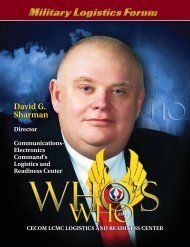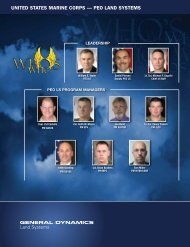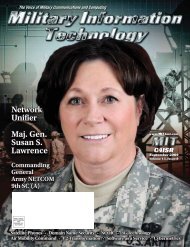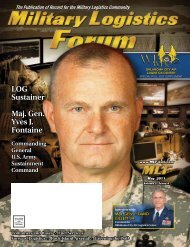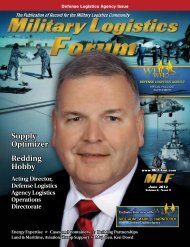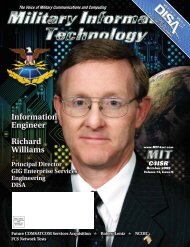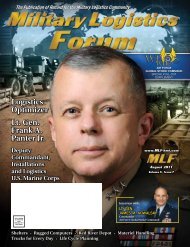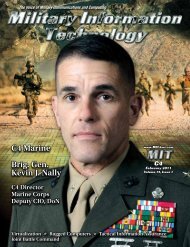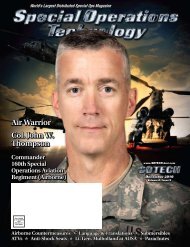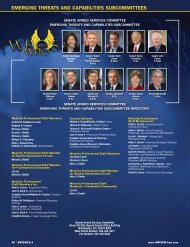Theater Logistician Maj. Gen. Kenneth S. Dowd - KMI Media Group
Theater Logistician Maj. Gen. Kenneth S. Dowd - KMI Media Group
Theater Logistician Maj. Gen. Kenneth S. Dowd - KMI Media Group
You also want an ePaper? Increase the reach of your titles
YUMPU automatically turns print PDFs into web optimized ePapers that Google loves.
•<br />
•<br />
•<br />
•<br />
•<br />
•<br />
•<br />
•<br />
•<br />
•<br />
Asset status and availability<br />
Warranty tracking and management<br />
Ownership and transfer of assets<br />
Escalation of requests<br />
Approvals and funds checking<br />
Proactive and reactive maintenance<br />
Maintenance history<br />
Effective management of resources<br />
Replenishment of supplies through<br />
automatic triggers<br />
Mobile field service enhanced, the ability<br />
work in connected or disconnected<br />
modes<br />
Subsequent GCSS-MC blocks will build<br />
on previous ones, adding new capabilities<br />
over time. When the program is mature<br />
and all requirements are fully implemented,<br />
it will consolidate more than 200 legacy<br />
logistics information systems into an integrated<br />
infrastructure that provides seamless<br />
end-to-end logistics chain management,<br />
advanced enterprisewide planning and joint<br />
interoperability.<br />
Q<br />
Q: What are the priorities for the<br />
next phase of the program and<br />
future enhancements?<br />
GCSS-MC capabilities will be delivered<br />
incrementally. To realize the benefits of integrated,<br />
state-of-the-art systems and common<br />
business processes as soon as possible, Block<br />
1, the first phase, has been divided into<br />
two releases. The initial release, Capability<br />
Release 1.1, focuses on providing capability<br />
www.MLF-kmi.com<br />
LIEUTENANT COLONEL<br />
JIM STONE<br />
(MARINE CORPS)<br />
to the MAGTF and the enterprise in three<br />
major functional areas: supply, maintenance<br />
and request management. This release is<br />
scheduled to begin field user evaluation<br />
at III Marine Expeditionary Force early in<br />
2010. The second release, Capability Release<br />
1.2, consists of the sophisticated technical<br />
solution that will enhance the MAGTF’s ability<br />
to access logistics data in any location or<br />
environment. Capability Release 1.2 allows<br />
for the secure transfer of data between the<br />
Nonsecure Internet Protocol Router Network<br />
[NIPRNET] and the Secure Internet<br />
Protocol Router Network [SIPRNET] and<br />
the ability to synchronize data between a<br />
continental United States GCSS-MC server<br />
[Enterprise Instance] and the scalable, tailored,<br />
deployed MAGTF instances that are<br />
cloned from the enterprise.<br />
While future blocks of capabilities are<br />
still in the planning stage, it is anticipated<br />
that they will focus on such areas as transportation/distribution,<br />
engineering, health<br />
services, life cycle management, advanced<br />
planning and base/garrison functions.<br />
PHILLIP WAUGH<br />
(AIR FORCE)<br />
From a logistics or supply chain perspective,<br />
the next big event for the Air Force is<br />
the integration of the Enterprise Resource<br />
Planning Solution—the Expeditionary<br />
Combat Support System [ECSS]. ECSS will<br />
replace most of the legacy logistics systems<br />
in use today, which is a huge undertaking.<br />
This phase of modernization will take<br />
several years with incremental deliveries of<br />
capability.<br />
As you might imagine, it’s important<br />
to maintain a stable baseline for the legacy<br />
systems being subsumed over the course<br />
of ECSS development. However, real-world<br />
events, such as securing the nuclear enterprise,<br />
will almost certainly drive some legacy<br />
system modifications. In addition, there<br />
are a small number of systems that will<br />
not be subsumed by ECSS. These systems,<br />
and the aforementioned modifications, will<br />
continue to target enterprise hosting and<br />
the shared services offered by GCSS.<br />
COLONEL<br />
JEFFREY K. WILSON<br />
(ARMY)<br />
The GCSS-Army project office is capturing<br />
lessons learned in the 2007 release<br />
at the National Training Center and is<br />
applying them to future implementations.<br />
The next release, scheduled for 2010, will<br />
include unit-level supply, property book,<br />
ground maintenance, and tactical finance<br />
support capabilities at the National Training<br />
Center. A future release planned for<br />
2011 will address aviation maintenance,<br />
ammunition, environmental health and<br />
safety, and cost management functions. It<br />
is estimated that more than 170,000 soldiers<br />
will use GCSS-Army when it is fully<br />
deployed. ✯<br />
Marine Corps Lieutenant Colonel Jim<br />
Stone is the senior Marine/director for<br />
global implementation. Phillip Waugh is<br />
with Air Force Headquarters 754th ELSG/<br />
ILSS. Army Colonel Jeffrey K. Wilson is the<br />
project manager Global Combat Support<br />
System-Army (GCSS-Army).<br />
MLF 3.7 | 17




